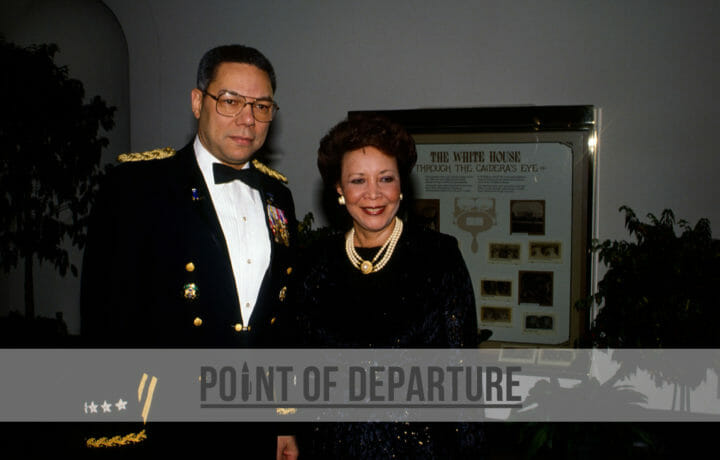“There is no end to the good you can do if you don’t care who gets the credit.” – Colin Powell
Monday morning started like most days. I walked the dogs, went for a run, and settled in with a cup of coffee to scan my news feed. Then the bottom fell out of my stomach. Colin Powell was trending. That’s rarely a good sign, especially among our more senior citizens. One mouse click revealed what I feared the most: He was gone.
“We have lost a remarkable and loving husband, father, grandfather and a great American,” the family said in a public statement.
Although he was fully vaccinated, Parkinson’s and multiple myeloma – a cancer of the plasma cells that suppresses the body’s immune response – left him vulnerable to a breakthrough infection. In what would be his last interview, he told former Washington Post journalist Bob Woodward, “Don’t feel sorry for me, for god’s sakes. I’m (almost) 85 years old.” After a health battle that endured for more than two years, Powell was as resilient as ever. “I haven’t lost a day of life fighting these two diseases. I’m in good shape.” A fighter to the end.
AN ICON FOR A GENERATION
My introduction to Colin Powell came like most young leaders of my generation. His command photograph hung on the wall of my battalion headquarters, first as the commander of U.S. Army Forces Command and later as Chairman of the Joint Chiefs. By the time we’d deployed to Saudi Arabia for Operation Desert Shield, his presence alongside General H. Norman Schwarzkopf made for a dynamic duo that brought Operation Desert Storm to quick—and seemingly decisive—conclusion.
When I read his autobiography, My American Journey, it left an immediate and lasting impact. His 2012 memoir, It Worked for Me: In Life and Leadership, only reinforced my respect for the man. I’ve read my share of memoirs, but few strike the same chord—Powell’s incredible life story takes a back to the lessons he freely shares. His books are a MasterClass in leadership, and my copies are filled with highlighted passages and margin notes. When Colin Powell spoke, I listened. And so did a lot of others.
Few leaders leave as strong an impression on a generation as Colin Powell. John Wooden’s pyramid of success is a model for building successful teams; his 12 lessons in leadership serve as a paradigm for leading those teams. Former Defense Secretary James Mattis—revered by many as the prototypical “warrior monk”—influenced a decidedly loyal following among leaders from a variety of circles. Steve Jobs proved a truly significant force in business whose influence endured long after his death. Like Powell, they are remembered as iconoclastic leaders who rose above the bounds of their chosen professions to leave an indelible mark on the world.
13 RULES
Powell’s leadership lessons, drawn from decades of service to the nation, always resonated with me. Those lessons form countless lists, not that unusual for someone so quotable, so memorable. In his 2012 memoir, Powell drew on the lessons and anecdotes of decades in uniform. But it’s the first few pages of that book—his 13 Rules of Leadership—that have the greatest impact. Like most leadership lists, Powell’s rules are actually lessons themselves, gleaned from a lifelong commitment to leading.
The genius of the 13 Rules is in their simplicity; the power is in their brevity. I’ve seen those rules posted in offices from the Pentagon to local police station, from a remote headquarters in Mosul to a restaurant in New York City. Those rules matter to a lot of very different people. Like Colin Powell, they inspire. They unite. They mean something special.
A COLD DAY IN OCTOBER
As I read the news of his death, I couldn’t help but think we’d all lost someone who inspired hope. He was always a humble man, a leader who put the needs of those around him ahead of his own. When Bob Woodward asked Powell to name the greatest person he had ever known, he responded, “It’s Alva Powell.”
Even after a career of firsts, he never stopped giving back. After his retirement from the military, he could have easily stepped out of the limelight and taken a lucrative private sector position. But he didn’t. He continued to serve, continued to inspire: with his words, his actions, his wisdom.
As the tributes began to pour in from around the world, they carried the emotion of people who found in him a leader who made a difference in their lives. Of those, one in particular captured the moment in an especially poignant manner. Condoleezza Rice, who succeeded Powell as Secretary of State following his retirement in 2005, remarked of her dear friend that “much of his legacy will live on in the countless number of young lives he touched.”
In life, our goal isn’t to live forever, but to create a legacy that will. Colin Powell’s immortality is enshrined in his.




